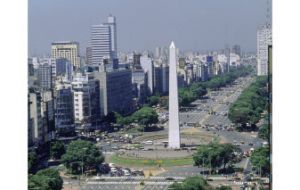MercoPress. South Atlantic News Agency
The vexing puzzle of Argentina, according to the Financial Times
 The capital Buenos Aires, once considered the Paris of South America
The capital Buenos Aires, once considered the Paris of South America An editorial comment from the Financial Times October 14th edition, “In a tango of debt” gives a good idea of what world markets think and feel about Argentina.
Basically once a land of opportunities as promising as any of today’s leading nations, the vexing puzzle has become a land of “squandered opportunities”
Follows the FT piece which according to the feedback from some of the Buenos Aires local media comments, has received a significant degree of acceptance.
In a tango of debt
What a vexing puzzle Argentina is. Once a land of opportunity, as promising as the US, it has instead been mired in relative stagnation. There are those who say its only case for being in the Group of 20 is its superior knowledge of serial sovereign defaults.
To be fair, that is not the whole truth. In the 1990s Argentina was a paragon of sound money, its currency board fixing the money supply to its stock of dollars. Tying itself to the mast did wonders while the sailing was smooth, but was also a death trap. In the wake of the Asian financial crisis Argentina was sunk by capital flight and by an uncompetitive exchange rate when other countries devalued.
Nor have Argentines been unambiguous economic villains after the near-100 billion US dollars default in 2001. They paid off debts to the International Monetary Fund with the air of someone freed from indenture. Some private debt was settled. With help from the commodity boom, the budget has been in primary surplus. In any case, capital markets have short memories and will embrace Argentina again.
And yet. The state is locked in a precarious dance of forced roll-overs, including Treasury raids on the coffers of other public sector entities. Amado Boudou, the finance minister, repaid 2.24 billion US dollars of debt in August, but is up against 5 billion more coming due next year.
The public debt burden is hardly unbearable – 45% of output, less than half to foreign lenders. Mr Boudou is ostensibly ready to negotiate on 6.7 billion US dollars owed to the Paris Club of official lenders and 29 billion of privately held defaulted bonds. But Argentina has pulled out of settlements before, and Mr Boudou is coy about what he will accept.
Efforts to hold out for a good deal – and to find ways to treat “vulture funds” more harshly than those who bought the debt in good faith, as Mr Boudou wants – are quite legitimate. But the pride that graces a tango can be a hindrance in debt management. The longer it takes to settle, the more Argentina will pay on new debt in the future.
Ultimately Argentina’s greatest handicap is its Peronist politics, which substitutes populism for policy. Twin windfalls – the commodity boom and the default – could have cushioned reforms to boost the export sector and reduce inefficiencies at home. Argentines have instead been subjected to harmful export taxes, expropriated pensions, and fudged inflation figures.
South America badly needs good regional leadership, but Argentina can barely lead itself. Until this improves, it continues to be a land of squandered opportunities.




Top Comments
Disclaimer & comment rules-

Read all commentsAnsering this article of the financial times, i would like to say that i am really sorprised of seing two articles about my country in only one week, just at the same time that the goverment is according to go back to the money markets.
Oct 17th, 2009 - 05:44 am 0Of course that the politigians made very big mistakes, it's a very suffered nation, firstly by the militar dictatorships, and after by the corruption of democratic presidents.
In spite of all that, many countrys would like to have our tecnologic development, and the prestigium of our public universitys, many foreign people are coming to argentina to study at the public universitys, specially at the u.b.a. (university of buenos aires).
I agree that argentina would be in a better situation, it's true that our social situacion got better in the last 5 years , but we stilll have the 30 porcent of our population under the line of povertys, not the 15 like the goverment says
Commenting for this story is now closed.
If you have a Facebook account, become a fan and comment on our Facebook Page!